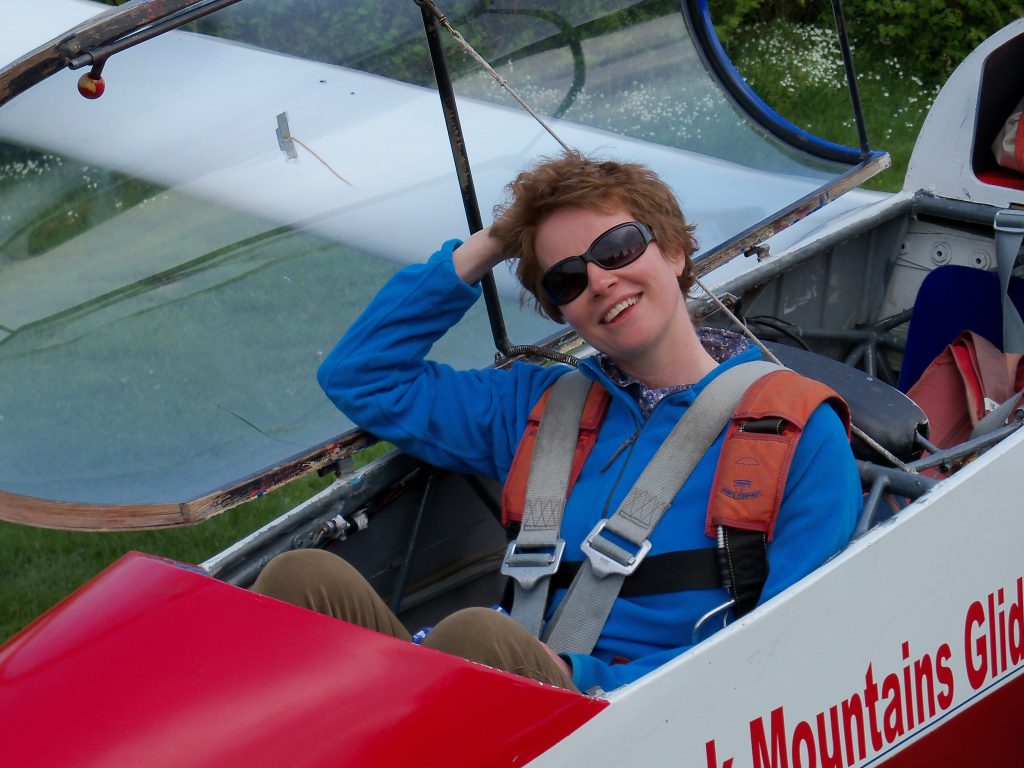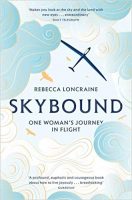 Rebecca Loncraine: ‘Part of my way of psychologically healing myself after cancer… is to rearrange my relationship with time. Flying offers me the means to do this.’ Picture © POLLY BECK
Rebecca Loncraine: ‘Part of my way of psychologically healing myself after cancer… is to rearrange my relationship with time. Flying offers me the means to do this.’ Picture © POLLY BECK
‘Skybound’ by REBECCA LONCRAINE, published this month in Picador paperback, is a hymn to glider flying and a celebration of wind and wings. It’s a remarkable book, one in which the writer, for whom the world had closed down as a result of cancer, feels it reopen, and carries the reader up on the thermals with her. In this extract, she tells how flying transformed her understanding of time
The more time I spend in the air observing, in ever greater detail, what is happening in the sky and on the ground, the more I start to notice the sun’s movement across the sky. And, with this renewed awareness, there also burns into me a new sense of time and place. I feel the season in the strength of the sun’s warmth, the time of day in the angle it hits me, and my direction of travel in which side of my face it’s shining on. In one moment of heat on my skin, the sun becomes a felt calendar, clock and compass.
Many pilots, I notice, are like this; they just know which compass direction they are heading in all the time, in the air and on the ground. It has become instinctive.
Driving through the narrow lanes, I glance in my rear-view mirror and look up at the sky above and behind the car. There is a giant cumulus cloud growing and the sun is shining through the back of it. It is summer, mid-morning, must be eleven-ish. I know I am heading roughly south-east.
Later that day, I am helping Mum and Dad with the shearing, out in the field by the barn. I collect up huge fleeces, waxy yellow with lanolin, and lay them out on a trestle table; I fold in the legs and tail of each one, rolling it up into a woolly ball to shove into the giant sacks of fleeces to send off to the wool board.The dogs pant in the shade as they watch the sheep being undressed. My hands are oily and the sharp animal-sweat smell of raw wool sticks in my nose. Lanny, the local farmer who comes to shear our flock each year, is bent over a ewe, halfway through shearing her, when he looks up and asks the time. Neither Dad nor I wear a watch, but we both immediately turn our heads to the sky; we know the pattern of the sun as it moves daily around our valley.
‘Twelve fifty,’ says Dad.
‘Twelve thirty,’ I say.
We later look at a clock and we were not far wrong. Approximate time is perfectly adequate here; we’ve no trains to catch.
This renewed sense of place and time is slowly relocating me in the natural world, and although I am sailing up in the air whenever I can, I am also beginning to feel more grounded in natural processes. It is a relief, because a painful sense of being unnatural grew in me after my cancer diagnosis. Cancer made me feel excluded from nature because I became ill so young, and, after diagnosis, my body felt alien – a mutant, rejected from the natural order of things. Now, though broken and scarred, I am re-establishing a place for myself, I am finding my way back into the natural world through time. When you fly without an engine, human and clock time seem to disappear as a new kind of time surfaces, one that is natural and multi-layered and changes at different speeds and at different altitudes. Like the movements and route of an unpowered flight, time seems to have become rounded, curving, circular, spiralling, connected both to the shapes on the ground and to the rhythms of the day as the sun arcs across the sky.
Flying time is both stretched and shrunk. On landing, a two-hour flight seems to have passed in an instant and yet each individual moment of that flight was huge and full.
‘A glider pilot makes about four decisions every second,’ Bo tells me, and perhaps it’s this concentrated decision-making that expands time for us.
When I mention this time-warping to other pilots, many acknowledge that their sense of time changes in the air too.
‘Time passes more quickly,’ says Mike Codd, a fellow club pilot, ‘especially flying cross-country, when you’re so busy reading the sky and making decisions.’
Time seems to disappear altogether for Bo. When teaching flying, he wears a watch to time the flights. ‘Sometimes I don’t know if one minute or ten minutes have passed, so I have to look at my watch to keep track,’ he says. ‘When you are flying, an hour can go by so quickly . . . You don’t realize it . . . Your focus removes your sense of time passing.’
The Greeks identified two kinds of time: chronos and kairos. Chronos is man-made time, clocked and calendared. But kairos is something different, something altogether more unruly and unpredictable – a shape-shifting, wild time. When I’m flying, a variety of timescales within kairos seem to open up to me, but, in truth, before I started to learn to fly, I was already remote from chronos. Illness totally blew apart my previous sense of time, and, during my treatment, I discovered dimensions of time that I’d never felt before. Moments waiting silently for the results of a scan seemed like a painful forever, and each long, slow day crawling through the side-effects of chemotherapy was a giant frozen clock face.
But I could take advantage of this slowing down, too. I could sit silently by the fire in the kitchen, while Mum and Dad cooked, watching the dog sleeping, his breathing body lit by the flames; I watched birds at the feeders outside the kitchen window, and from my bedroom, with great attention, noticing every jerky movement as they hopped about with nuts in their beaks. Such ordinary things were transformed by my focused attention into moments of wonder, inside which I found enormous resilience, and therefore slow, painful time became a resource to help me get through the treatment. In the days leading up to a chemotherapy session, I’d savour every moment as a way of slowing the time down and holding off the appointment for as long as possible.
I now know that time can warp and bend, speed up, circle and deepen, depending on what you do inside it. Part of my way of psychologically healing myself after cancer, knowing that I’ve to face the horror of ongoing tests for the rest of whatever length of life I have, is to rearrange my relationship with time. Flying offers me the means to do this, enabling me to confirm this sense of the subjectivity of time, and, crucially, strengthening my ability to expand it. I am learning to inhabit and stretch time, to dive into it rather than skim over its meniscus surface.
*
I circle beneath a cloud in a thermal and Bo tells me to slow my speed to stay in the lift. I pull back a millimetre on the stick and slow to forty-five knots; the air quietens; I look down at the green Dragon’s Back with the brown slash of the sheep track, worn larger by hikers weaving up its spine. The hill seems to rotate beneath me. I feel at the very centre of this moment, full and fat with life.
The past and the future recede to tiny dots. I imagine a cross-section of a second from up here. So much happens: my heart beats, as does Bo’s, as do hearts across the ground below, of people, birds, sheep, horses, foxes and other wild animals hidden in the undergrowth, and night creatures sleeping underground and in tree hollows. I breathe out, thousands of other creatures breathe in, a swallow flies past, a tree branch waves, wind full of dust, pollen and bacteria brushes my face, something decays a little bit, something grows a little bit. Every single second is wide and vast, and we’ve got 86,400 of them a day. Each second is a little infinity of its own.
 Extracted from Skybound: One Woman’s Journey in Flight by Rebecca Loncraine (Picador, £8.99)
Extracted from Skybound: One Woman’s Journey in Flight by Rebecca Loncraine (Picador, £8.99)
© Rebecca Loncraine 2018
Rebecca Loncraine, a freelance writer, was born in England but grew up on a hill farm in the Black Mountains of Wales, where she returned after being diagnosed with breast cancer. It was there, after her recovery, that she fell in love with gliding. She began writing Skybound in response to her new passion and was finishing the book when, in 2015, she became ill again. She died at home in Wales in September 2016.
Skybound has been acclaimed by reviewers and was short-listed in the memoir category of the Edward Stanford Travel Writing Awards.
Rebecca Loncraine was also the author of The Real Wizard of Oz: The Life and Times of L Frank Baum, published by Gotham Books in 2009.
